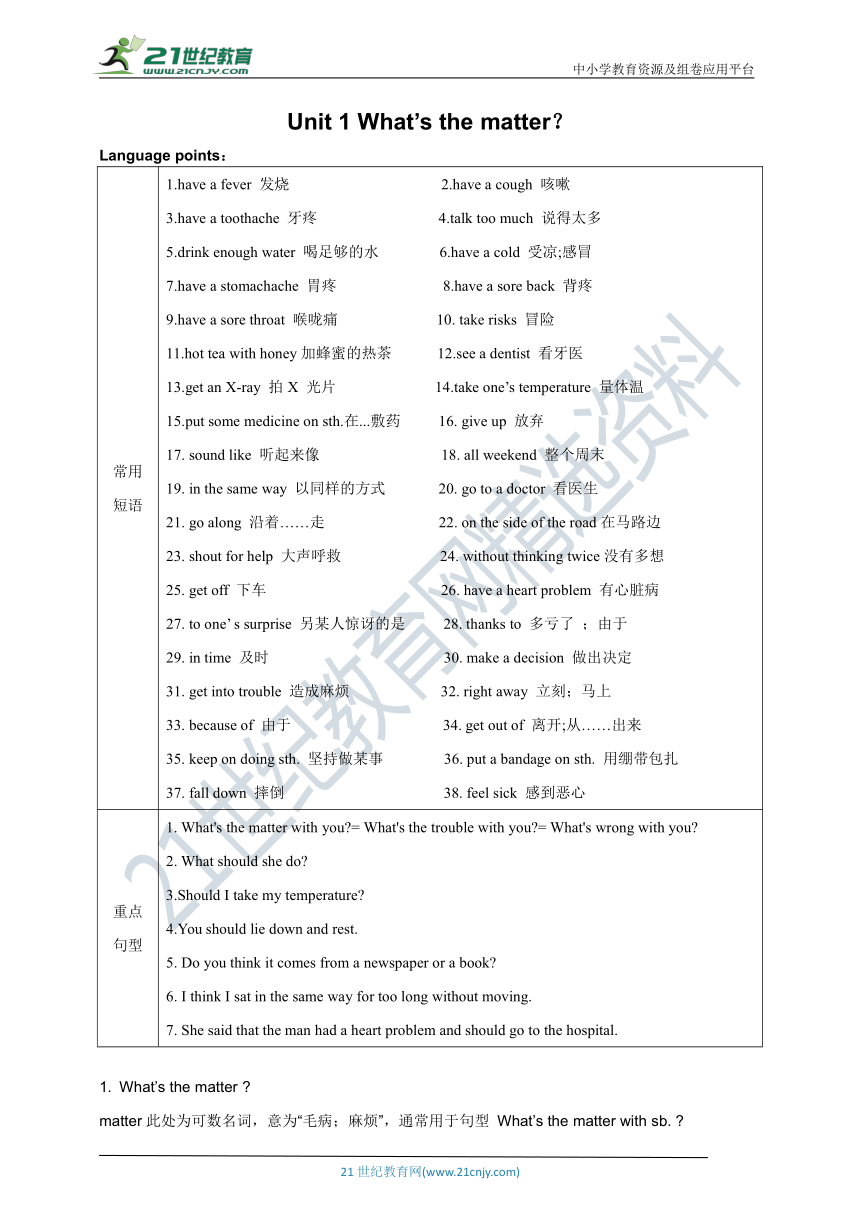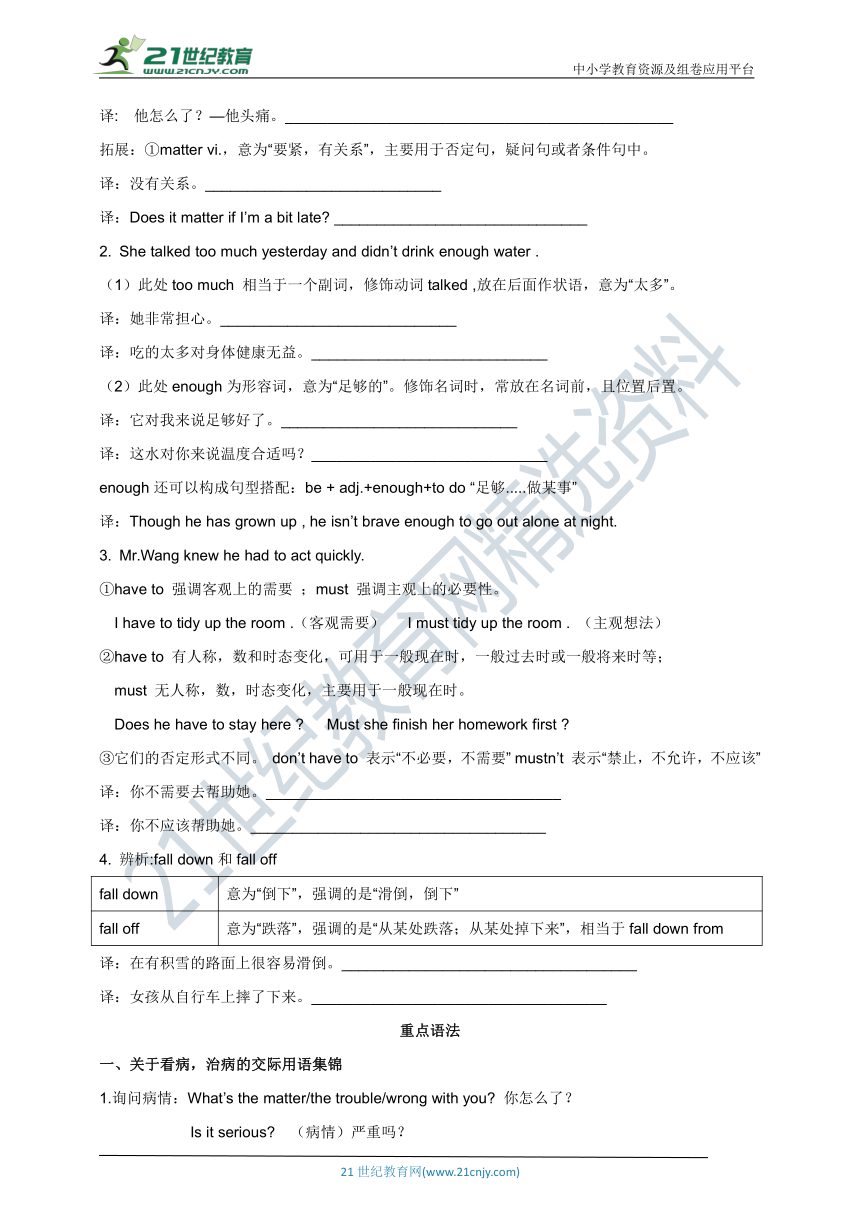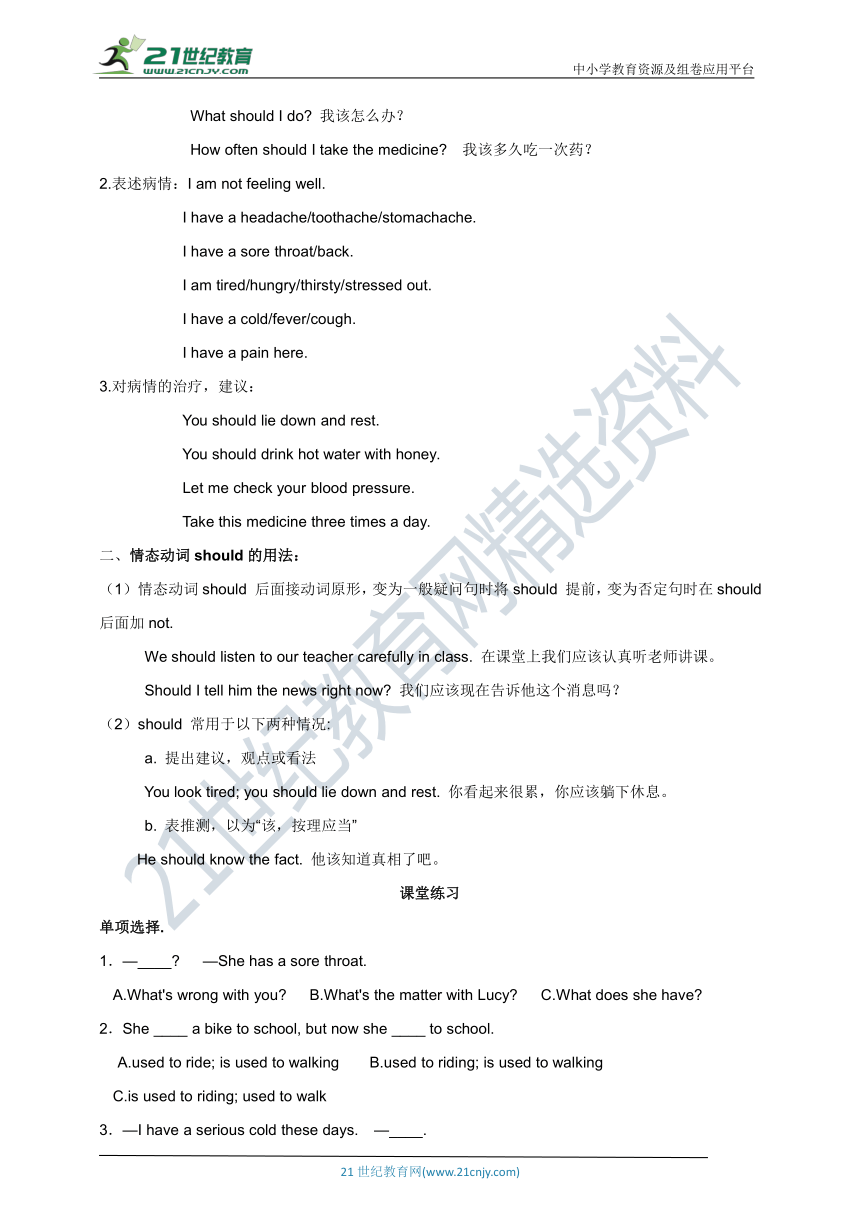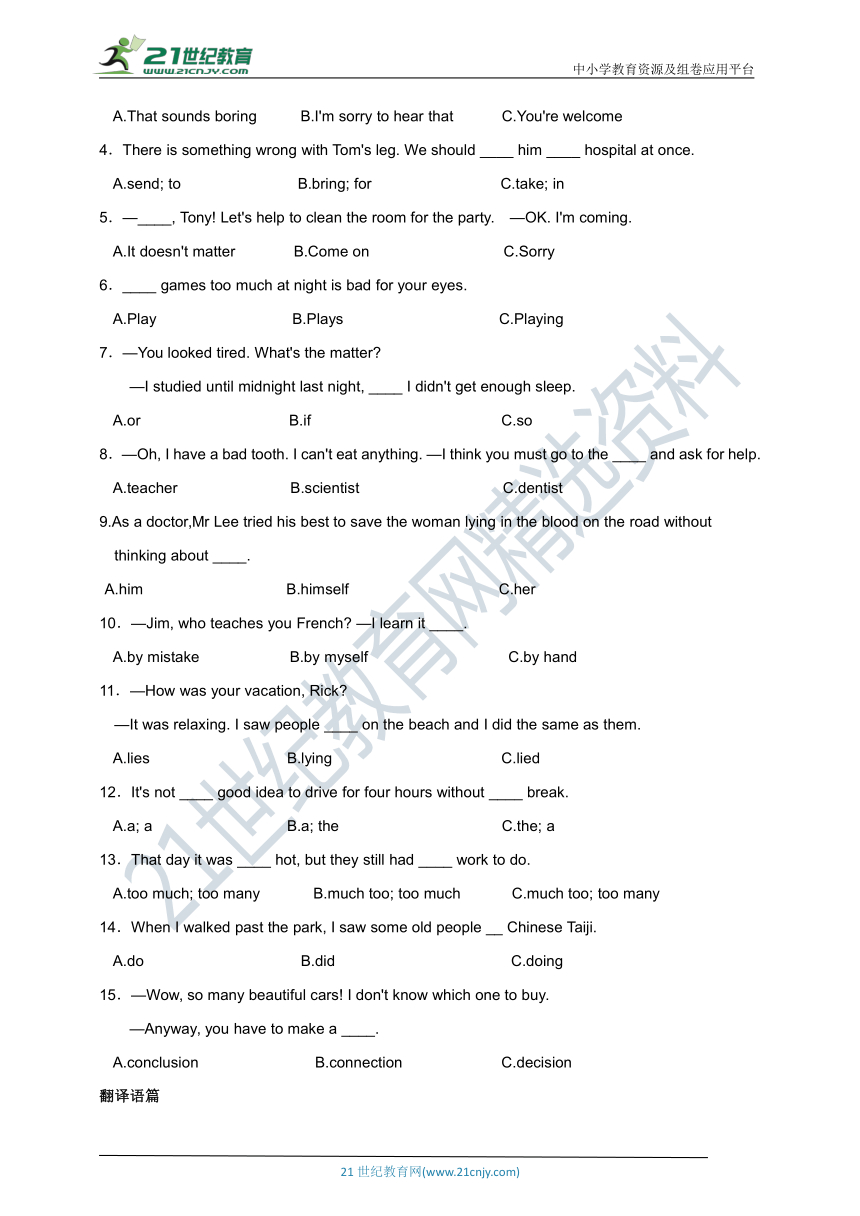Unit 1 What's the matter?知识点归纳与练习(含答案)
文档属性
| 名称 | Unit 1 What's the matter?知识点归纳与练习(含答案) |  | |
| 格式 | zip | ||
| 文件大小 | 1.2MB | ||
| 资源类型 | 试卷 | ||
| 版本资源 | 人教新目标(Go for it)版 | ||
| 科目 | 英语 | ||
| 更新时间 | 2021-02-19 20:50:06 | ||
图片预览




文档简介
中小学教育资源及组卷应用平台
Unit
1
What’s
the
matter?
Language
points:
常用短语
1.have
a
fever
发烧
2.have
a
cough
咳嗽3.have
a
toothache
牙疼
4.talk
too
much
说得太多5.drink
enough
water
喝足够的水
6.have
a
cold
受凉;感冒7.have
a
stomachache
胃疼
8.have
a
sore
back
背疼9.have
a
sore
throat
喉咙痛
10.
take
risks
冒险11.hot
tea
with
honey加蜂蜜的热茶
12.see
a
dentist
看牙医13.get
an
X-ray
拍X
光片
14.take
one’s
temperature
量体温15.put
some
medicine
on
sth.在...敷药
16.
give
up
放弃17.
sound
like
听起来像
18.
all
weekend
整个周末19.
in
the
same
way
以同样的方式
20.
go
to
a
doctor
看医生21.
go
along
沿着……走
22.
on
the
side
of
the
road在马路边23.
shout
for
help
大声呼救
24.
without
thinking
twice没有多想25.
get
off
下车
26.
have
a
heart
problem
有心脏病27.
to
one’
s
surprise
另某人惊讶的是
28.
thanks
to
多亏了
;由于29.
in
time
及时
30.
make
a
decision
做出决定
31.
get
into
trouble
造成麻烦
32.
right
away
立刻;马上33.
because
of
由于
34.
get
out
of
离开;从……出来35.
keep
on
doing
sth.
坚持做某事
36.
put
a
bandage
on
sth.
用绷带包扎37.
fall
down
摔倒
38.
feel
sick
感到恶心
重点句型
1.
What's
the
matter
with
you?=
What's
the
trouble
with
you?=
What's
wrong
with
you?
2.
What
should
she
do?
3.Should
I
take
my
temperature?
4.You
should
lie
down
and
rest.
5.
Do
you
think
it
comes
from
a
newspaper
or
a
book?
6.
I
think
I
sat
in
the
same
way
for
too
long
without
moving.7.
She
said
that
the
man
had
a
heart
problem
and
should
go
to
the
hospital.
What’s
the
matter
?
matter此处为可数名词,意为“毛病;麻烦”,通常用于句型
What’s
the
matter
with
sb.
?
译:
他怎么了?—他头痛。______________________________________________
拓展:①matter
vi.,意为“要紧,有关系”,主要用于否定句,疑问句或者条件句中。
译:没有关系。____________________________
译:Does
it
matter
if
I’m
a
bit
late?
______________________________
She
talked
too
much
yesterday
and
didn’t
drink
enough
water
.
(1)此处too
much
相当于一个副词,修饰动词talked
,放在后面作状语,意为“太多”。
译:她非常担心。____________________________
译:吃的太多对身体健康无益。____________________________
(2)此处enough为形容词,意为“足够的”。修饰名词时,常放在名词前,且位置后置。
译:它对我来说足够好了。____________________________
译:这水对你来说温度合适吗?____________________________
enough还可以构成句型搭配:be
+
adj.+enough+to
do
“足够.....做某事”
译:Though
he
has
grown
up
,
he
isn’t
brave
enough
to
go
out
alone
at
night.
Mr.Wang
knew
he
had
to
act
quickly.
①have
to
强调客观上的需要
;must
强调主观上的必要性。
I
have
to
tidy
up
the
room
.(客观需要)
I
must
tidy
up
the
room
.
(主观想法)
②have
to
有人称,数和时态变化,可用于一般现在时,一般过去时或一般将来时等;
must
无人称,数,时态变化,主要用于一般现在时。
Does
he
have
to
stay
here
?
Must
she
finish
her
homework
first
?
③它们的否定形式不同。
don’t
have
to
表示“不必要,不需要”
mustn’t
表示“禁止,不允许,不应该”
译:你不需要去帮助她。___________________________________
译:你不应该帮助她。___________________________________
辨析:fall
down和fall
off
fall
down
意为“倒下”,强调的是“滑倒,倒下”
fall
off
意为“跌落”,强调的是“从某处跌落;从某处掉下来”,相当于fall
down
from
译:在有积雪的路面上很容易滑倒。___________________________________
译:女孩从自行车上摔了下来。___________________________________
重点语法
一、关于看病,治病的交际用语集锦
询问病情:What’s
the
matter/the
trouble/wrong
with
you?
你怎么了?
Is
it
serious?
(病情)严重吗?
What
should
I
do?
我该怎么办?
How
often
should
I
take
the
medicine?
我该多久吃一次药?
表述病情:I
am
not
feeling
well.
I
have
a
headache/toothache/stomachache.
I
have
a
sore
throat/back.
I
am
tired/hungry/thirsty/stressed
out.
I
have
a
cold/fever/cough.
I
have
a
pain
here.
对病情的治疗,建议:
You
should
lie
down
and
rest.
You
should
drink
hot
water
with
honey.
Let
me
check
your
blood
pressure.
Take
this
medicine
three
times
a
day.
二、情态动词should的用法:
情态动词should
后面接动词原形,变为一般疑问句时将should
提前,变为否定句时在should
后面加not.
We
should
listen
to
our
teacher
carefully
in
class.
在课堂上我们应该认真听老师讲课。
Should
I
tell
him
the
news
right
now?
我们应该现在告诉他这个消息吗?
should
常用于以下两种情况:
a.
提出建议,观点或看法
You
look
tired;
you
should
lie
down
and
rest.
你看起来很累,你应该躺下休息。
b.
表推测,以为“该,按理应当”
He
should
know
the
fact.
他该知道真相了吧。
课堂练习
单项选择.
1.—____?
—She?has?a?sore?throat.
?????A.What's
wrong?with
you?
B.What's?the?matter?with?Lucy?
C.What?does?she?have?
?
2.She
____
a
bike
to
school,
but
now
she
____
to
school.
???
??A.used
to
ride;
is
used
to
walking
B.used
to
riding;
is
used
to
walking
?????C.is
used
to
riding;
used
to
walk
?
3.—I
have
a
serious
cold
these
days.
—____.
?????A.That
sounds
boring
??
???B.I'm
sorry
to
hear
that
?C.You're
welcome
?????
4.There
is
something
wrong
with
Tom's
leg.
We
should
____
him?____
hospital
at
once.
?????A.send;
to
?
B.bring;
for???
?
C.take;
in
5.—____,?Tony!?Let's?help?to?clean?the?room?for?the?party.
—OK.?I'm?coming.
?????A.It
doesn't
matter
???
??
B.Come
on
?
???
C.Sorry
?????
6.____
games
too
much
at
night
is
bad
for
your
eyes.
?????A.Play
B.Plays????
?
C.Playing
?
7.—You
looked
tired.
What's
the
matter?
—I
studied
until
midnight
last
night,
____
I
didn't
get
enough
sleep.
?????A.or????
B.if???
??
C.so
8.—Oh,
I
have
a
bad
tooth.
I
can't
eat
anything.
—I
think
you
must
go
to
the
____
and
ask
for
help.
?????A.teacher
???
B.scientist??
??
C.dentist???
9.As?a?doctor,Mr?Lee?tried?his?best?to?save?the?woman?lying?in?the?blood?on?the?road?without?
thinking?about?____.
??A.him
?????
B.himself
??
???
C.her
?????
10.—Jim,
who
teaches
you
French?
—I
learn
it
____.
?????A.by
mistake
?
?B.by
myself
C.by
hand??
11.—How
was
your
vacation,
Rick?
—It
was
relaxing.
I
saw
people
____
on
the
beach
and
I
did
the
same
as
them.
?????A.lies
?
B.lying
???
C.lied
?
12.It's
not
____
good
idea
to
drive
for
four
hours
without
____
break.
?????A.a;
a
?
B.a;
the
?
C.the;
a
13.That
day
it
was?____
hot,
but
they
still
had
____
work
to
do.
?????A.too
much;
too
many??
?
??B.much
too;
too
much
??C.much
too;
too
many
????
14.When
I
walked
past
the
park,
I
saw
some
old
people
__
Chinese
Taiji.
?????A.do
?
?
B.did?
???
?
C.doing
???
15.—Wow,
so?many?beautiful?cars!
I?don't?know?which?one?to?buy.
—Anyway,
you?have?to?make?a?____.
?????A.conclusion??
?
B.connection?
?
C.decision?
翻译语篇
June
6
is
National
Eye
Care
Day,
everyone
should
try
to
keep
eyes
healthy.
What
are
common
eye
problem
we
have
today?
How
can
we
protect
our
eyes?
Read
on
to
find
out
the
answer.
Eyes
are
important
in
our
everyday
life.
We
use
them
to
read
books,
see
colors
and
beautiful
sceneries(风景)
of
the
world.
11.但有时候,我们用眼太多这会伤害它们。
In
the
past,
nearsightedness(近视眼)
was
a
common
eye
problem
among
children.
12.This
is
mostly
because
of
their
bad
eye
habits,
such
as
watching
TV
too
long
and
reading
books
in
bed.
However,
today’s
technology
is
changing
the
way
we
live.
Children
spend
more
time
working
and
playing
in
front
of
computers,
smart
phones
and
ipads.
Some
US
children
spend
more
than
42
hours
a
week
in
front
of
electronic
screens.
This
has
caused
a
new
problem
for
our
eyestrain(眼疲劳).
13.
People
with
digital
eyestrain
may
get
headaches,
dry
and
red
eyes
and
other
eye
problems.
But
don’t
worry.
14.我们想出以下办法来帮助你保持眼睛健康。
When
you
are
using
mobile
devices(移动电子设备),
keep
them
at
least
30
cm
from
your
eyes.
Try
not
to
use
your
smart
phone
in
direct
sunlight.
15.
Remember
to
take
a
break:
every
20
minutes,
take
a
20-second
break
and
look
at
something
20
feet
away.
Spend
less
time
in
front
of
screens.
One
to
two
hours
a
day
is
OK
for
your
eyes.
11.___________________________________________________________________________12.___________________________________________________________________________13.___________________________________________________________________________14.___________________________________________________________________________15.___________________________________________________________________________
补全对话
A:
Hey,
David!
You
look
tired.
16.
?
B:
I
didn’t
get
enough
sleep
last
night.
A:
Were
you
doing
your
homework
last
night?
B:
17.
.There
were
too
many
exercises
for
me
to
do.
I
didn’t
sleep
until
midnight.
A:
So
that’s
why
you
don’t
look
well
today.
B:
Yes.
It’s
bad
for
my
health
18.
?
Sure,
I
advise
you
to
play
some
sports
first.
19.
. I’ll
follow
it.Thanks.
A:
And
you
should
have
a
good
rest
on
weekends.
B:
I
can’t.
I
have
after-school
classes
on
weekends
B.
20.
?
A:
Because
my
parents
want
me
to
get
good
grades.
B:You
could
tell
your
parents
that
health
is
the
most
important.
A:
Thank
you
for
your
good
advice.
I’m
going
to
talk
to
them.
Unit
1
What’s
the
matter?参考答案
单选
1-5
BABAB
6-10CCCBB
11.BABCC
翻译
11.
But
sometimes,
it
will
hurt
them
if
we
use
our
eyes
too
much.
12.
这大多是因为他们不良的用眼习惯,例如看太长时间的电视以及在床上看书。
13.
有数字视疲劳的人们可能会头痛,眼干,得红眼病和其他的眼部问题。
14.
We
come
up
with
following
ways
to
help
you
maintain
eye-health.
15.
记得要休息:每20分钟休息20秒,以及看看20尺远的事物
补全
16.
What
was
the
matter
with
you?
17.
Yes.
18.
Could
you
give
me
some
advice?
19.
All
right.
20.
Why
do
you
have
after-school
classes
on
weekends?
21世纪教育网
www.21cnjy.com
精品试卷·第
2
页
(共
2
页)
HYPERLINK
"http://21世纪教育网(www.21cnjy.com)
"
21世纪教育网(www.21cnjy.com)
Unit
1
What’s
the
matter?
Language
points:
常用短语
1.have
a
fever
发烧
2.have
a
cough
咳嗽3.have
a
toothache
牙疼
4.talk
too
much
说得太多5.drink
enough
water
喝足够的水
6.have
a
cold
受凉;感冒7.have
a
stomachache
胃疼
8.have
a
sore
back
背疼9.have
a
sore
throat
喉咙痛
10.
take
risks
冒险11.hot
tea
with
honey加蜂蜜的热茶
12.see
a
dentist
看牙医13.get
an
X-ray
拍X
光片
14.take
one’s
temperature
量体温15.put
some
medicine
on
sth.在...敷药
16.
give
up
放弃17.
sound
like
听起来像
18.
all
weekend
整个周末19.
in
the
same
way
以同样的方式
20.
go
to
a
doctor
看医生21.
go
along
沿着……走
22.
on
the
side
of
the
road在马路边23.
shout
for
help
大声呼救
24.
without
thinking
twice没有多想25.
get
off
下车
26.
have
a
heart
problem
有心脏病27.
to
one’
s
surprise
另某人惊讶的是
28.
thanks
to
多亏了
;由于29.
in
time
及时
30.
make
a
decision
做出决定
31.
get
into
trouble
造成麻烦
32.
right
away
立刻;马上33.
because
of
由于
34.
get
out
of
离开;从……出来35.
keep
on
doing
sth.
坚持做某事
36.
put
a
bandage
on
sth.
用绷带包扎37.
fall
down
摔倒
38.
feel
sick
感到恶心
重点句型
1.
What's
the
matter
with
you?=
What's
the
trouble
with
you?=
What's
wrong
with
you?
2.
What
should
she
do?
3.Should
I
take
my
temperature?
4.You
should
lie
down
and
rest.
5.
Do
you
think
it
comes
from
a
newspaper
or
a
book?
6.
I
think
I
sat
in
the
same
way
for
too
long
without
moving.7.
She
said
that
the
man
had
a
heart
problem
and
should
go
to
the
hospital.
What’s
the
matter
?
matter此处为可数名词,意为“毛病;麻烦”,通常用于句型
What’s
the
matter
with
sb.
?
译:
他怎么了?—他头痛。______________________________________________
拓展:①matter
vi.,意为“要紧,有关系”,主要用于否定句,疑问句或者条件句中。
译:没有关系。____________________________
译:Does
it
matter
if
I’m
a
bit
late?
______________________________
She
talked
too
much
yesterday
and
didn’t
drink
enough
water
.
(1)此处too
much
相当于一个副词,修饰动词talked
,放在后面作状语,意为“太多”。
译:她非常担心。____________________________
译:吃的太多对身体健康无益。____________________________
(2)此处enough为形容词,意为“足够的”。修饰名词时,常放在名词前,且位置后置。
译:它对我来说足够好了。____________________________
译:这水对你来说温度合适吗?____________________________
enough还可以构成句型搭配:be
+
adj.+enough+to
do
“足够.....做某事”
译:Though
he
has
grown
up
,
he
isn’t
brave
enough
to
go
out
alone
at
night.
Mr.Wang
knew
he
had
to
act
quickly.
①have
to
强调客观上的需要
;must
强调主观上的必要性。
I
have
to
tidy
up
the
room
.(客观需要)
I
must
tidy
up
the
room
.
(主观想法)
②have
to
有人称,数和时态变化,可用于一般现在时,一般过去时或一般将来时等;
must
无人称,数,时态变化,主要用于一般现在时。
Does
he
have
to
stay
here
?
Must
she
finish
her
homework
first
?
③它们的否定形式不同。
don’t
have
to
表示“不必要,不需要”
mustn’t
表示“禁止,不允许,不应该”
译:你不需要去帮助她。___________________________________
译:你不应该帮助她。___________________________________
辨析:fall
down和fall
off
fall
down
意为“倒下”,强调的是“滑倒,倒下”
fall
off
意为“跌落”,强调的是“从某处跌落;从某处掉下来”,相当于fall
down
from
译:在有积雪的路面上很容易滑倒。___________________________________
译:女孩从自行车上摔了下来。___________________________________
重点语法
一、关于看病,治病的交际用语集锦
询问病情:What’s
the
matter/the
trouble/wrong
with
you?
你怎么了?
Is
it
serious?
(病情)严重吗?
What
should
I
do?
我该怎么办?
How
often
should
I
take
the
medicine?
我该多久吃一次药?
表述病情:I
am
not
feeling
well.
I
have
a
headache/toothache/stomachache.
I
have
a
sore
throat/back.
I
am
tired/hungry/thirsty/stressed
out.
I
have
a
cold/fever/cough.
I
have
a
pain
here.
对病情的治疗,建议:
You
should
lie
down
and
rest.
You
should
drink
hot
water
with
honey.
Let
me
check
your
blood
pressure.
Take
this
medicine
three
times
a
day.
二、情态动词should的用法:
情态动词should
后面接动词原形,变为一般疑问句时将should
提前,变为否定句时在should
后面加not.
We
should
listen
to
our
teacher
carefully
in
class.
在课堂上我们应该认真听老师讲课。
Should
I
tell
him
the
news
right
now?
我们应该现在告诉他这个消息吗?
should
常用于以下两种情况:
a.
提出建议,观点或看法
You
look
tired;
you
should
lie
down
and
rest.
你看起来很累,你应该躺下休息。
b.
表推测,以为“该,按理应当”
He
should
know
the
fact.
他该知道真相了吧。
课堂练习
单项选择.
1.—____?
—She?has?a?sore?throat.
?????A.What's
wrong?with
you?
B.What's?the?matter?with?Lucy?
C.What?does?she?have?
?
2.She
____
a
bike
to
school,
but
now
she
____
to
school.
???
??A.used
to
ride;
is
used
to
walking
B.used
to
riding;
is
used
to
walking
?????C.is
used
to
riding;
used
to
walk
?
3.—I
have
a
serious
cold
these
days.
—____.
?????A.That
sounds
boring
??
???B.I'm
sorry
to
hear
that
?C.You're
welcome
?????
4.There
is
something
wrong
with
Tom's
leg.
We
should
____
him?____
hospital
at
once.
?????A.send;
to
?
B.bring;
for???
?
C.take;
in
5.—____,?Tony!?Let's?help?to?clean?the?room?for?the?party.
—OK.?I'm?coming.
?????A.It
doesn't
matter
???
??
B.Come
on
?
???
C.Sorry
?????
6.____
games
too
much
at
night
is
bad
for
your
eyes.
?????A.Play
B.Plays????
?
C.Playing
?
7.—You
looked
tired.
What's
the
matter?
—I
studied
until
midnight
last
night,
____
I
didn't
get
enough
sleep.
?????A.or????
B.if???
??
C.so
8.—Oh,
I
have
a
bad
tooth.
I
can't
eat
anything.
—I
think
you
must
go
to
the
____
and
ask
for
help.
?????A.teacher
???
B.scientist??
??
C.dentist???
9.As?a?doctor,Mr?Lee?tried?his?best?to?save?the?woman?lying?in?the?blood?on?the?road?without?
thinking?about?____.
??A.him
?????
B.himself
??
???
C.her
?????
10.—Jim,
who
teaches
you
French?
—I
learn
it
____.
?????A.by
mistake
?
?B.by
myself
C.by
hand??
11.—How
was
your
vacation,
Rick?
—It
was
relaxing.
I
saw
people
____
on
the
beach
and
I
did
the
same
as
them.
?????A.lies
?
B.lying
???
C.lied
?
12.It's
not
____
good
idea
to
drive
for
four
hours
without
____
break.
?????A.a;
a
?
B.a;
the
?
C.the;
a
13.That
day
it
was?____
hot,
but
they
still
had
____
work
to
do.
?????A.too
much;
too
many??
?
??B.much
too;
too
much
??C.much
too;
too
many
????
14.When
I
walked
past
the
park,
I
saw
some
old
people
__
Chinese
Taiji.
?????A.do
?
?
B.did?
???
?
C.doing
???
15.—Wow,
so?many?beautiful?cars!
I?don't?know?which?one?to?buy.
—Anyway,
you?have?to?make?a?____.
?????A.conclusion??
?
B.connection?
?
C.decision?
翻译语篇
June
6
is
National
Eye
Care
Day,
everyone
should
try
to
keep
eyes
healthy.
What
are
common
eye
problem
we
have
today?
How
can
we
protect
our
eyes?
Read
on
to
find
out
the
answer.
Eyes
are
important
in
our
everyday
life.
We
use
them
to
read
books,
see
colors
and
beautiful
sceneries(风景)
of
the
world.
11.但有时候,我们用眼太多这会伤害它们。
In
the
past,
nearsightedness(近视眼)
was
a
common
eye
problem
among
children.
12.This
is
mostly
because
of
their
bad
eye
habits,
such
as
watching
TV
too
long
and
reading
books
in
bed.
However,
today’s
technology
is
changing
the
way
we
live.
Children
spend
more
time
working
and
playing
in
front
of
computers,
smart
phones
and
ipads.
Some
US
children
spend
more
than
42
hours
a
week
in
front
of
electronic
screens.
This
has
caused
a
new
problem
for
our
eyestrain(眼疲劳).
13.
People
with
digital
eyestrain
may
get
headaches,
dry
and
red
eyes
and
other
eye
problems.
But
don’t
worry.
14.我们想出以下办法来帮助你保持眼睛健康。
When
you
are
using
mobile
devices(移动电子设备),
keep
them
at
least
30
cm
from
your
eyes.
Try
not
to
use
your
smart
phone
in
direct
sunlight.
15.
Remember
to
take
a
break:
every
20
minutes,
take
a
20-second
break
and
look
at
something
20
feet
away.
Spend
less
time
in
front
of
screens.
One
to
two
hours
a
day
is
OK
for
your
eyes.
11.___________________________________________________________________________12.___________________________________________________________________________13.___________________________________________________________________________14.___________________________________________________________________________15.___________________________________________________________________________
补全对话
A:
Hey,
David!
You
look
tired.
16.
?
B:
I
didn’t
get
enough
sleep
last
night.
A:
Were
you
doing
your
homework
last
night?
B:
17.
.There
were
too
many
exercises
for
me
to
do.
I
didn’t
sleep
until
midnight.
A:
So
that’s
why
you
don’t
look
well
today.
B:
Yes.
It’s
bad
for
my
health
18.
?
Sure,
I
advise
you
to
play
some
sports
first.
19.
. I’ll
follow
it.Thanks.
A:
And
you
should
have
a
good
rest
on
weekends.
B:
I
can’t.
I
have
after-school
classes
on
weekends
B.
20.
?
A:
Because
my
parents
want
me
to
get
good
grades.
B:You
could
tell
your
parents
that
health
is
the
most
important.
A:
Thank
you
for
your
good
advice.
I’m
going
to
talk
to
them.
Unit
1
What’s
the
matter?参考答案
单选
1-5
BABAB
6-10CCCBB
11.BABCC
翻译
11.
But
sometimes,
it
will
hurt
them
if
we
use
our
eyes
too
much.
12.
这大多是因为他们不良的用眼习惯,例如看太长时间的电视以及在床上看书。
13.
有数字视疲劳的人们可能会头痛,眼干,得红眼病和其他的眼部问题。
14.
We
come
up
with
following
ways
to
help
you
maintain
eye-health.
15.
记得要休息:每20分钟休息20秒,以及看看20尺远的事物
补全
16.
What
was
the
matter
with
you?
17.
Yes.
18.
Could
you
give
me
some
advice?
19.
All
right.
20.
Why
do
you
have
after-school
classes
on
weekends?
21世纪教育网
www.21cnjy.com
精品试卷·第
2
页
(共
2
页)
HYPERLINK
"http://21世纪教育网(www.21cnjy.com)
"
21世纪教育网(www.21cnjy.com)
同课章节目录
- Unit 1 What's the matter?
- Section A
- Section B
- Unit 2 I'll help to clean up the city parks.
- Section A
- Section B
- Unit 3 Could you please clean your room?
- Section A
- Section B
- Unit 4 Why don't you talk to your parents?
- Section A
- Section B
- Unit 5 What were you doing when the rainstorm came
- Section A
- Section B
- Review of Units 1-5
- Unit 6 An old man tried to move the mountains.
- Section A
- Section B
- Unit 7 What's the highest mountain in the world?
- Section A
- Section B
- Unit 8 Have you read Treasure Island yet?
- Section A
- Section B
- Unit 9 Have you ever been to a museum?
- Section A
- Section B
- Unit 10 I've had this bike for three years.
- Section A
- Section B
